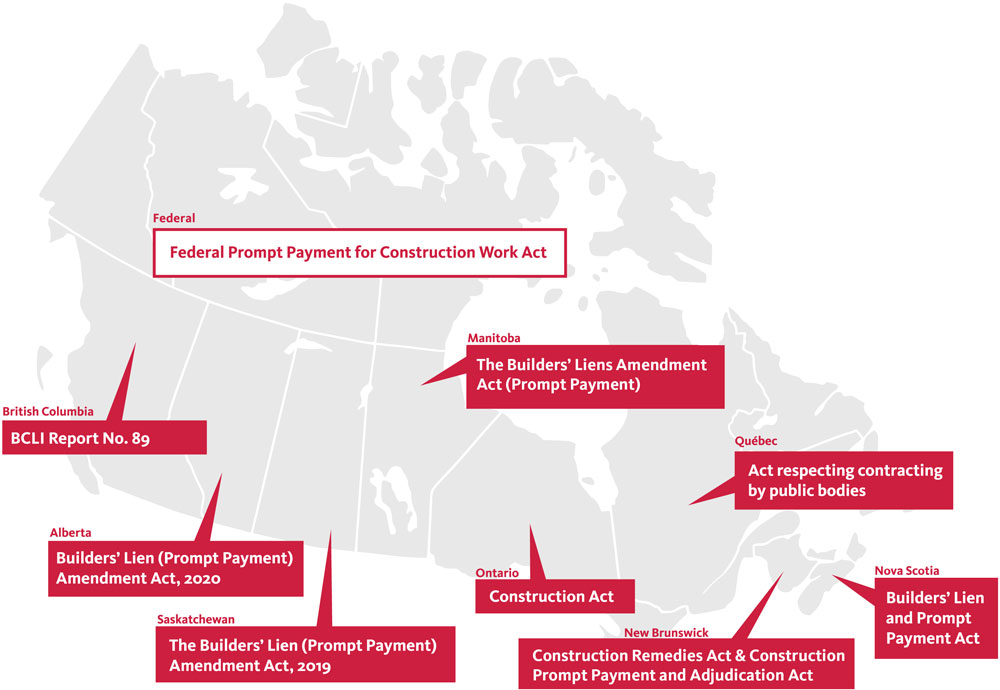How recent developments are impacting the Canadian construction and infrastructure sector
Updated on: December 21, 2023

Prompt payment and adjudication legislation is being enacted across Canada in an effort to alleviate perceived payment delays down the construction pyramid. We have provided a brief overview covering the developments in each jurisdiction which we will continue to update with the latest news and useful insights; so check back regularly.
In Ontario, the changes to the Construction Act (formerly the Construction Lien Act) introducing prompt payment and adjudication came into force on October 1, 2019. The prompt payment regime comprises swift payment deadlines, requiring the owner either to pay within 28 calendar days or to dispute within 14 calendar days, describing the reasons for non-payment. In turn, the contractor must either pay its subcontractors within seven calendar days of receipt of payment or send notices of dispute within seven calendar days, as described in a previous Update. Introduced by the Construction Act, adjudication is a quick interim method to resolve disputes on a construction project. An adjudication must begin prior to completion of the contract or subcontract, unless the parties agree otherwise. The adjudication regime in Ontario is being administered and overseen by the Ontario Dispute Adjudication for Construction Contracts (ODACC), which has released its third Annual Report, as discussed in our Adjudication: ODACC releases third annual report blog. Ontario was the first jurisdiction with a prompt payment and adjudication regime layered on top of an existing construction lien regime. While the interactions between this regime and liens have been considered, to a large degree, our team continues to uncover additional issues in practice and devise contractual solutions for our clients.
In Nova Scotia, the Builders’ Lien Act (amended) received royal assent on April 12, 2019, but it has yet to come into force. Once in force, the current lien legislation will be renamed Builders’ Lien and Prompt Payment Act. Although the amendments introduce concepts from Ontario’s new prompt payment regime, it takes a narrower approach with regard to availability of adjudication. Unless exempted by the regulations, the amendments are applicable to contracts and subcontracts made after the date of enactment. On November 9, 2022, An Act to Amend Chapter 277 of the Revised Statutes, 1989, the Builders’ Lien Act, which establishes the Adjudication Authority, received royal assent, but it too has yet to come into force. Our team is monitoring progress on this front, as we await regulations prescribing application of the amendment, payment timelines, adjudication procedures, and details regarding notice of non-payment.
In Saskatchewan, The Builders’ Lien (Prompt Payment) Amendment Act, 2019 (the Amendment Act) and The Builders’ Lien Amendment Regulations, 2020 (SR 92/2020) (the Amendment Regulations) came into force on March 1, 2022, as described in our blog. The Amendment Act and Amendment regulations describe a prompt payment and adjudication regime that largely parallels Ontario’s regime. The Saskatchewan Construction Dispute Resolution Office (SCDRO), a new not-for-profit corporation, will act as the official adjudication authority and the ADR Institute of Saskatchewan Inc. will work with the SCDRO to provide adjudicators. The prompt payment and adjudication regime does not apply to architects, engineers, land surveyors and persons providing services or materials for any improvement with respect to a mine or mineral resource that is not oil and gas (including any activities regarding exploration, development, production, decommissioning or reclamation) or an improvement related to infrastructure in connection with the generation, transmission or distribution of electrical energy pursuant to the Power Corporation Act.
In Alberta, The Builders’ Lien (Prompt Payment) Amendment Act, 2020 (the Amendment Act) came into force on August 29, 2022, along with the Prompt Payment and Adjudication Regulation and the Prompt Payment and Construction Lien Forms Amendment Regulation, as discussed in our Alberta’s Prompt Payment and Adjudication Regulations update. The Amendment Act focuses on major reforms to the Builders’ Lien Act (the Act), including the introduction of prompt payment, adjudication, an extension of lien registration periods, and renaming the Act as the Prompt Payment and Construction Lien Act. Unlike Ontario’s prompt payment regime, monthly billings are mandated through proper invoices issued at least every 31 days, unless any applicable contractual provisions for testing and commissioning are not met, or unless the project agreement has been exempted pursuant to Alberta Regulation 122/2023 [PDF], which describes qualifying criteria and names specific project agreements. The Amendment Act also makes major lien fund and minor lien fund payments to the contractor mandatory if certain conditions are met, as detailed in our “Amending Bill 37: Alberta’s prompt payment regime” blog. Contracts entered into prior to August 29, 2022, and scheduled to remain in effect for longer than two years past that date will be given until August 29, 2024, to be amended to make their terms comply with the new provisions of the Act. While the Prompt Payment and Construction Lien Act applies to registered professional engineers and architects contracted to act in a consultative capacity in respect of an improvement, it does not apply to public works (as defined in the Public Works Act) nor agreements to finance and undertake an improvement in which either the Crown, in right of Alberta, or certain agents of the Crown, in right of Alberta, is a party.
In British Columbia, in July 2020, the British Columbia Law Institute published a Report on The Builders Lien Act [PDF] which presents 86 recommendations to simplify the Builders Lien Act and clarify the meaning of the more problematic provisions. According to the Report, prompt payment and adjudication pertain to general financial management of construction projects, whereas the lien legislation is concerned with security of payment. In November 2021, a series of town hall events were held to promote the adoption of prompt payment legislation; however, the preferred prompt payment regime remains unclear. On May 4, 2023, the British Columbia Construction Association was notified that the Ministry of Attorney General staff will convene a large table consultation with interested groups to determine how prompt payment legislation could best work in the province.
In Manitoba, The Builders’ Liens Amendment Act (Prompt Payment) [PDF] (the Amendment Act) received royal assent on May 30, 2023, and will come into force on a day yet to be proclaimed. The Amendment Act introduces a prompt payment and adjudication regime, including the requirement to submit a proper invoice, deadlines for payment or notice of non-payment, interest on delayed payment, and mandatory adjudication for the determination of payment disputes, for contracts and subcontracts entered into on or after the date the Amendment Act comes into force. To accommodate the new prompt payment regime, the Amendment Act also extends the deadlines for lien remedies from 40 days to 60 days. Unlike Ontario, the prompt payment and adjudication regime does not apply to the professional fees and charges for architects and engineers. The Amendment Act provides for transitional matters to be addressed in a regulation, but as of yet no such regulation has been published.
In New Brunswick, Law Reform Notes #42 (July 2019) and Law Reform Notes #43 (April 2020), published by the Office of the Attorney General, recommended the reform of the Mechanics’ Lien Act and the introduction of prompt payment and adjudication be in two phases. In the first phase, the Construction Remedies Act and the General Regulation, which both came into force on November 1, 2021, repealed and modernized the existing lien legislation by amending lien, holdback, trust, substantial performance, and security bond provisions. To address the second phase, the Construction Prompt Payment and Adjudication Act (the Act), which received royal assent on June 16, 2023, creates a prompt payment and adjudication regime applicable to all contracts entered into on or after the date the Act comes into force and all subcontracts associated with such contracts, unless exempted by regulation.
In Québec, An Act to facilitate oversight of public bodies’ contracts and to establish the Autorité des marchés publics, which received royal assent on December 1, 2017, amended the Act regarding contracting by public bodies and allowed the Conseil du trésor to implement pilot projects to facilitate payments to enterprises which are parties to certain public contracts and subcontracts. In 2018, the Chair of the Conseil du trésor, by order, authorized the implementation of the pilot project, involving more than 180 listed public infrastructures, to facilitate payment to enterprises that are parties to public construction work contracts and related public subcontracts using prescribed payment calendars and dispute settlement by adjudicators. A report on the outcomes of the pilot project, tabled on March 3, 2022, concluded that in general, both the payment calendars and the dispute settlement processes produced the desired results, allowing for better collaboration between parties and for quick and effective dispute resolution. On June 2, 2022, the report’s recommendations were implemented following assent of An Act mainly to promote Québec-sourced and responsible procurement by public bodies, to reinforce the integrity regime of enterprises and to increase the powers of the Autorité des marchés publics, which amends the Act respecting contracting by public bodies. Among the adopted amendments are the obligation to pay sums due in the context of public construction contracts within a timeframe established by regulation, the establishment of a voluntary third-party dispute resolution mechanism for payment disagreements, and the accumulation of interest in the event of late payment. Specific regulations have not yet been adopted.
At the federal level, the Federal Prompt Payment for Construction Work Act (the Act), which addresses the non-payment of contractors and subcontractors performing construction work for federal construction projects, and the Federal Prompt Payment for Construction Work Regulations [PDF] (the Regulations), one addressing criteria, time limits, interest and circumstances and the other addressing dispute resolution, came into force on December 9, 2023. Canada Dispute Adjudication for Construction Contracts (CanDACC) has been appointed as the Adjudicator Authority. The Act surprisingly will not grandfather existing contracts. Instead, it will provide for a one-year deferral period before it applies to existing contracts. At that point, it may be imagined that the sudden application mid-performance of the new law to existing contracts drafted before the Act came into effect may be quite disruptive to those contracts. The federal government may choose to exempt federal projects from the federal regime individually and has designated the provinces of Ontario, Saskatchewan and Alberta, where reasonably similar provincial legislation has been adopted, for the non-application of certain provisions of the Act. For more information on the federal prompt payment landscape, see our previous legislation update and previous blog post.
Preparing your organization
By staying informed — and engaging legal experts with proven experience and know-how — industry participants can ensure that their existing projects are not disrupted in mid-performance and new projects are structured in the most effective way. This mitigates the risk of encountering serious issues after the fact and minimizing the potential of unforeseen delays and cost overruns.
Osler’s National Construction and Infrastructure Group, ranked Band 1 in Chambers Canada, and which is comprised of commercial and disputes lawyers, advises stakeholders on how to best shape the transition to new prompt payment legislations across Canada, redesign internal processes to remain compliant, and revise existing contracts and contract templates, scaled from the smallest to the largest and most complex projects in Canada.
Osler is now offering the following services to clients through new and innovative alternative fee arrangements:
- Osler Review: An efficient and cost-effective review of your existing contracts or contract templates and updating them to comply with the amendments in your region.
- Osler DIY: Access to Osler’s online tools to assist your organization in self-managing issues of importance, such as identifying dates for payments and payment notices.
- Learn from Osler: Best practices training for your organization, such as the development of a “playbook,” to put your organization in the best possible position to manage the various forms of payment-related notices with an accelerated payment cycle as well as handling dispute resolution under the new adjudication regime.
- Osler Compare: Access to blacklined versions comparing the applicable provisions of the Construction Act of Ontario or the existing lien legislation of your region with the changes proposed by the amendments in your region, and
- Osler Support: Specific or comprehensive adjudication support, whether you are responding to or initiating an adjudication, which may eventually continue into arbitration, litigation and other alternative dispute resolution advice post-adjudication.


